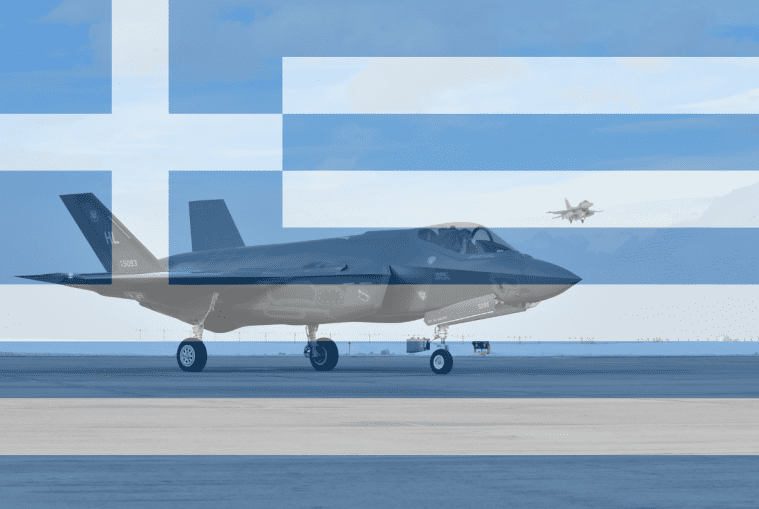by J. Kasper Oestergaard, European Correspondent, Forecast International.
Greece might find itself joining the field of F-35 operators in the not-so-distant future as part of a larger effort to improve the capabilities of its Air Force through upgrades and acquisitions. During a visit to Andravida Air Base on April 5, Defense Minister Evangelos Apostolakis stated that Greece will consider acquiring the F-35 to replace its oldest F-16s.
“Beyond the upgrade of the F-16 fighter jets, we are in the process of selecting a new plane for Greece, so we can gradually move to the new generation of aircraft,” Apostolakis said.
According to the Hellenic Air Force, the oldest F-16s in its fleet are 70 F-16C/D Block 30/50 models purchased in 1985 (Block 30 delivered 1989-90) and 1993 (Block 50 delivered 1997-98). Reports by local media suggest that Athens has already requested pricing and availability information from Lockheed Martin for 25-30 F-35As. Any purchase will, however, depend on Greece’s financial plans and the ability of the United States to offer a long-term payment framework.
The talk about a potential Greek F-35 purchase was spurred on by a written statement submitted to the House Armed Services Subcommittee by the head of the F-35 Joint Program Office (JPO), Vice Adm. Mat Winter. In his statement, Winter listed Greece among a number of potential Foreign Military Sales (FMS) customers. Recently, U.S. Ambassador to Greece Geoffrey Ross Pyatt commented that because Greece is already upgrading many of its F-16s, it would be a “natural stepping stone” for the country to also acquire the F-35A.
The Greek F-16 modernization program will upgrade 54 F-16C/D Block 52+ variants (delivered from 2002-2004) and 30 Block 52+ Advanced variants (delivered from 2009-2010) to the F-16V Block 70/72 configuration. On December 20, 2018, Lockheed Martin was awarded a $997 million contract for the effort, which is expected to be completed by June 30, 2027. The work will be performed by Lockheed Martin and Hellenic Aerospace Industry (HAI), the leading aerospace company in Greece.
Greece’s F-16 fleet was mainly acquired to counter the military strength of traditional arch-rival Turkey. For centuries, relations between Greek and Turkish states have been marked by alternating periods of mutual hostility and reconciliation. Tensions between the two nations are still high, and for years Greek and Turkish pilots have engaged in mock dogfights over the Aegean Sea. As U.S. relations with Turkey continue to deteriorate and with Ankara at risk of being removed from the F-35 program, Greece and Cyprus could emerge as key substitutes for American interests in the region.
Hellenic Air Force F-16 Fleet
Peace Xenia I:
40 F-16C/D Block 30
Active: 32 / Lost: 8
Future: Potential replacement by the F-35A
Peace Xenia II:
40 F-16C/D Block 50
Active 38 / Lost: 2
Future: Potential replacement by the F-35A
Peace Xenia III:
60 F-16C/D Block 52+
Active: 54 / Lost: 5 (+1 stored)
Future: Will be upgraded to the F-16V configuration
Peace Xenia IV:
30 F-16C/D Block 52+ Adv.
Active: 30
Future: Will be upgraded to the F-16V configuration
References:
- https://www.flightglobal.com/news/articles/greece-eyes-f-35s-as-f-16-replacement-457481/
- https://www.reuters.com/article/us-usa-defense-f35/pentagon-eyes-f-35-sales-to-greece-romania-and-poland-u-s-official-idUSKCN1RG2OF
- https://greece.greekreporter.com/2019/04/05/united-states-mulls-f-35-fighter-jet-sales-to-greece/
- https://www.thenationalherald.com/238425/defense-chief-says-greece-will-look-at-buying-f-35s-to-counter-turkey/
- https://www.thenationalherald.com/239510/after-18-months-greek-turkish-foreign-ministries-talking-again/
- https://armedservices.house.gov/2019/4/navy-and-marine-corps-tactical-aviation-and-ground-modernization
- https://dod.defense.gov/News/Contracts/Contract-View/Article/1719367/
- https://www.haf.gr/en/equipment/
- https://www.dsca.mil/major-arms-sales/government-greece-upgrade-f-16-aircraft-f-16-block-v-configuration
- https://www.flickr.com/photos/hafspokesman/sets/72157690016851091
- https://ahvalnews.com/turkey-greece/facing-great-strategic-opportunity-greece-must-remain-calm-analysis



















